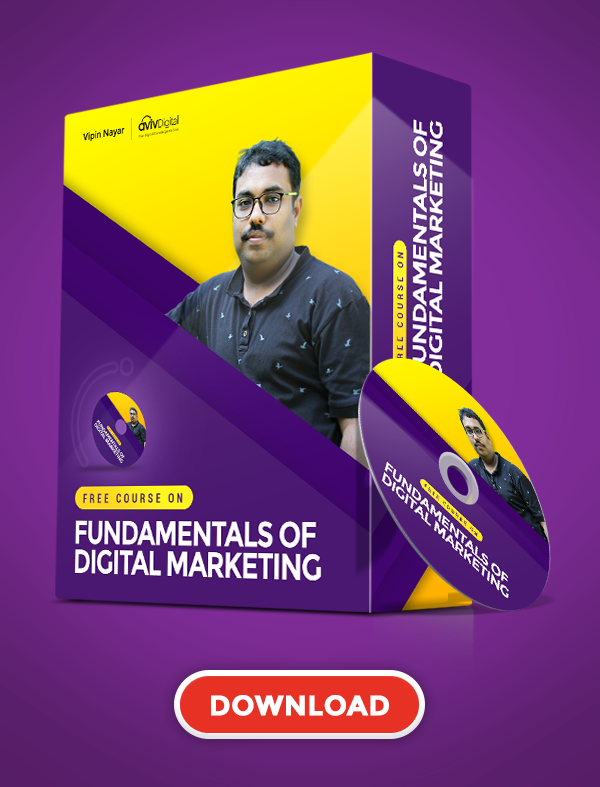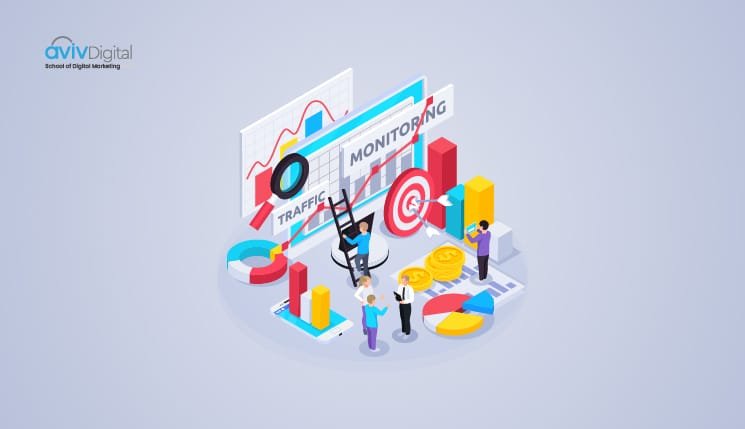
Digital marketing strategies become stronger when they are tracked and improved continuously. Today’s marketing is data-centric, which ensures efficient management of marketing resources. Thus, data is collected and analysed in terms of KPI and other metrics, and utilising these resources can be more of being a professional in digital marketing.
To make digital marketing strategies successful in a city like Calicut, too, metrics and KPIs also work out more effectively than mere ideas of marketing. To discuss more about the role of KPIs and metrics, we will be covering these topics in this article.
What are KPIs and Metrics?
The key performance indicators(KPIs) are indicators that help you understand the value of marketing campaigns. They are necessary in tracking the progress of a company’s strategy and ultimately help in decision-making, and evaluating the outcomes of an implemented strategy. These indicators are also considered as they can directly influence the brand’s goals and objectives.
Some of the significant KPIs are used for boosting sales, customer lifetime value and retaining the customers, which we will be explaining in the coming sections.
Metrics, on the other hand, are not as significant as KPIs, but they have an essential role in understanding the progress of a company. Here, activities in digital marketing are considered which use different sets of metrics for learning, where the basic idea of marketing gets faulty. Some of the examples are conversion ratio, return rate, acquisition costs, and so on.
Most Eye-Catching KPIs for Calicut Marketers
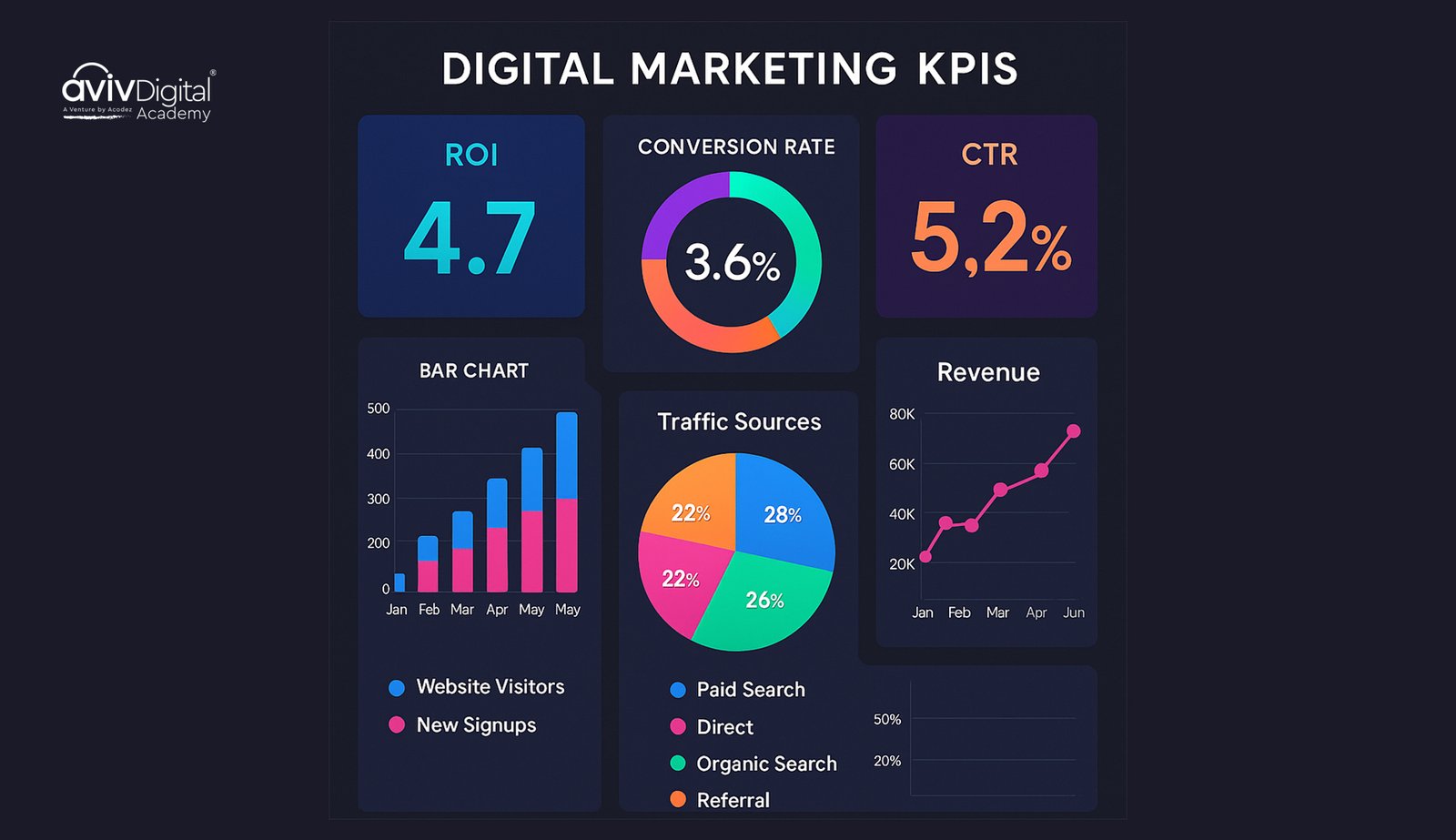
In this section, let’s explore some of the significant KPIs that are in use mostly and have helped for companies’ digital marketing strategies. For every niche, there are KPIs that can satisfy each a set of goals.
1. Search engine optimisation (SEO) KPIs
Search engine optimisation is a thorough process of website building and optimisation, which has to be certainly calculated to achieve future goals and benefits. For that, KPIs are used, and they are listed as follows:-
Organic traffic is a key KPI that implies the total visits in search engines. It can help you oversee whether your SEO strategies yield traffic for a particular web page.
Keyword Rankings help check the position of targeted keywords in SERPs. By looking into this, you can drive visitors to your website and improve further.
Non-branded traffic is crucial in understanding your capability to attract newer visitors who do not know your brand before finding your website on Google.
Search visibility is used to calculate the frequency of your website based on target keywords and can be used to check for multiple searches, too.
Organic Conversions measure the total number of visitors from organic search results who have completed desired actions, such as purchasing, retargeting, downloading resources, and subscribing to newsletters.
Bounce Rate is the percentage of visitors who view only one page and then leave the site without taking any further action. The average bounce rate for content pages should be monitored, as high bounce rates indicate content doesn’t meet visitor expectations
Common SEO tools like Google Analytics, Semrush, Ahrefs, and Google Search Console can be used to utilise these KPIs.
2. Social Media KPIs
Social media platforms aren’t solely for posting interactive content that is expected to meet better visibility and goals. Here, KPIs are also to be worked on more efficiently so that every activity in your brand’s social media accounts can get the desired results. Some of the social media KPIs consist as follows:-
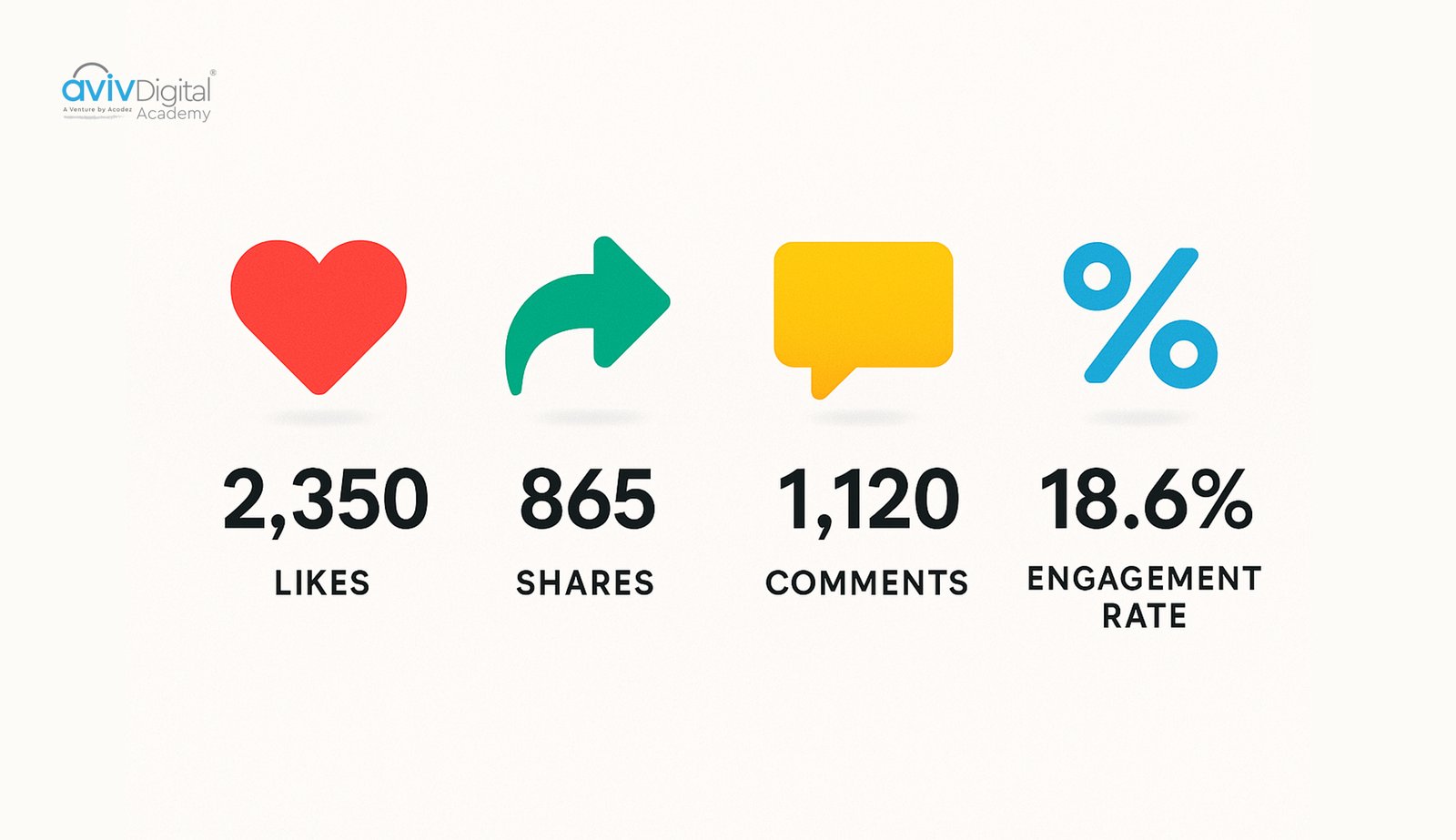
Likes, Comments, and Shares are key ingredients of social media marketing. These don’t require analytics to check; the platforms themselves display them. They are essential for learning the trends of social media content and how popular it is among its audience.
Follower Growth Rate measures the rate at which followers are earned. It’s calculated by dividing the new followers by the total followers and multiplying by 100. This growth rate is used to evaluate the potential of content and strategies for gaining new followers.
Reach can be analysed to see how many people reach the posts. This KPI is mainly used to find whether the content consumed is good and well-performing and the impact of social media marketing on our business, more than that, to see when your audience is live. Average reach and engagement rates vary by platform, use industry benchmarks to compare your performance
3. Paid Search Marketing KPIs
This area of digital marketing drives paid traffic in search engine results, contrasting the idea of SEO. As it’s a part of advertising, KPIs play too much importance in running such campaigns in the search engine. The popular KPIs in paid search marketing are as follows:-
Click-through Rate is the percentage of users who have clicked on a particular ad after seeing it. It has a significant role in analysing the attractiveness and engaging nature of ads. By dividing the clicks by impressions and then multiplying by 100, you can get your click-through rate.
Cost-per-click is the average cost incurred for every click on your ad. It helps balance the effectiveness of costs and advertisements.
Conversion Rates play a prominent role in luring visitors to your webpage. These visitors are then targeted to convert into customers or subscribers, which makes your ad spend worthwhile. Tracking conversion rates can help you understand the significance of generating new leads, boosting sales, and innovating more to engage leads.
Cost per acquisition is a KPI that can be attained by dividing the total ad spend by the number of new customers achieved over a period. This KPI can be useful if you find issues with the content and keywords for any ad campaigns. You can also add personalised elements to make them catchy.
Return On Investment designs the profitability of all marketing activities, not except paid search marketing. A positive ROI can mean you are benefiting from the campaigns and receiving profits. If it’s negative, all marketing efforts can go in vain and again, get your eyes straight for checking the profitabilty of campaigns.
4. Email marketing KPIs
Email marketing uses email as a platform to market your products. However, to make it more engaging, learning in detail about the essential email KPIs is necessary. Thus, let’s see some of the email KPIs in this section.
Signup Rate is the percentage of visitors who signed up for email lists, newsletters, and other resources like case studies.
Open Rate is the percentage of recipients who have received and opened your mail. This rate is calculated by dividing the opened emails by the delivered emails and multiplying it by 100.
Bounce Rate in email marketing defines the percentage of messages rejected by their clients. This concept is core, as you can understand why your messages weren’t delivered as expected.
Delivery Rate is the percentage of delivered messages, which can be derived by subtracting the number of bounces from the number of sends and dividing it by the number of sends.
Event Lag is the time delay that lags the action a consumer might take and the time when the email was delivered.
Other than these, there are more email marketing KPIs like unsubscribe rate, campaign performance, conversions, click-through rate, etc, which also play a vital role in measuring email marketing. Email marketing achieves an average ROI of $38 for every $1 spent in e-commerce. So it is important to track the KPIs of email marketing
Metrics That You Shouldn’t Definitely Miss!
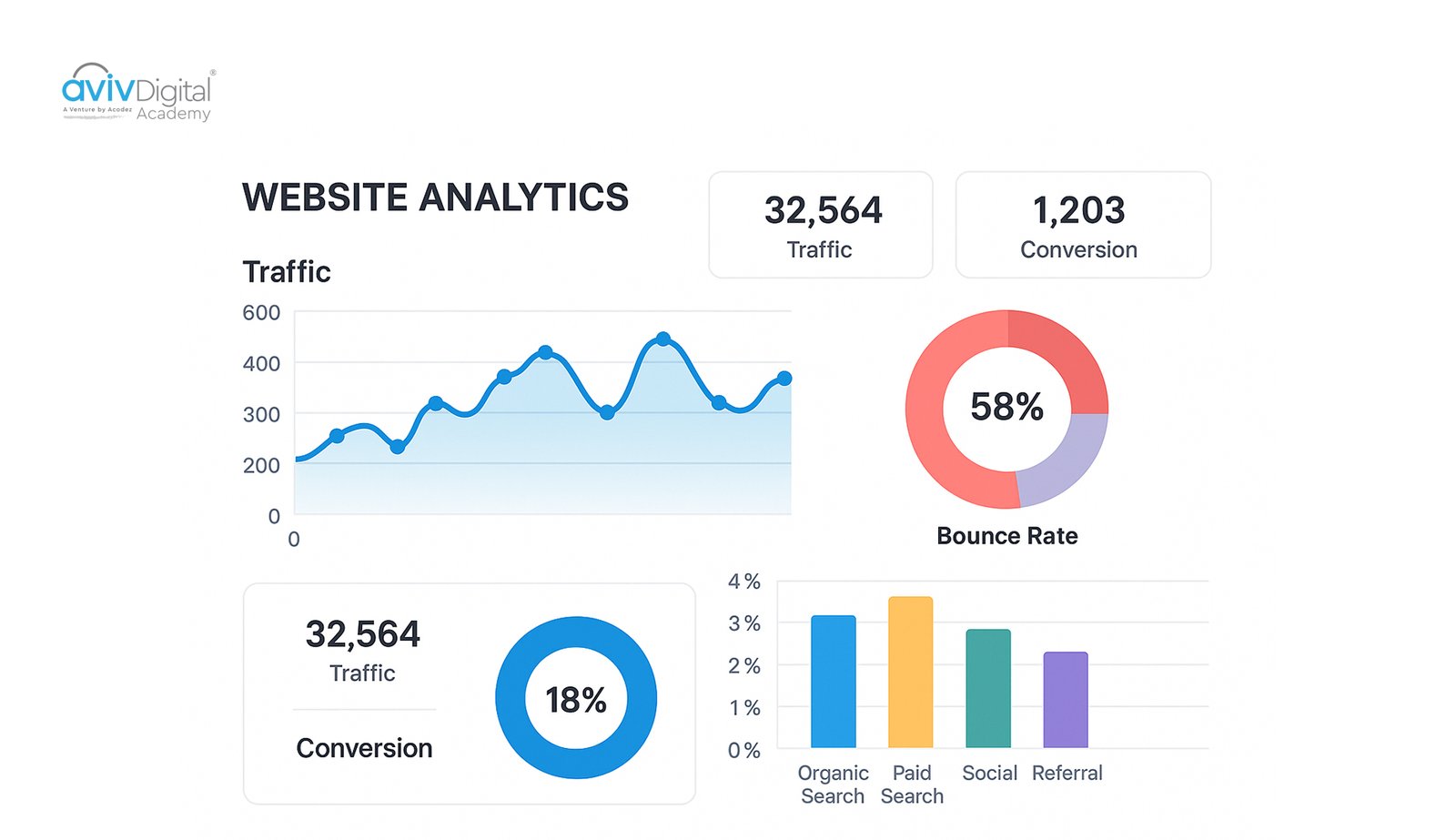
Here, let’s dive into the metrics you definitely can’t miss as a digital marketer in Calicut.
- Traffic metrics
You shouldn’t miss out on metrics such as total traffic( organic + paid + social + referral), as they can help you see where new visitors come from and how many customers repeatedly visit your website.
- Engagement metrics
Engaging the audience is a core value of marketing, and finding it out rests on metrics like bounce rate( leaving the page without completing an action by visitors), average session duration(users’ time spent on the page), and pages per session( average number of pages viewed by the user in his/her session). If explored, there may be more metrics that can help you work on the engagement side of marketing!
- Conversion metrics
Other than conversion rate, metrics like cost per conversion (cost for each conversion) and abandonment rate (for analysing the reasons for cart abandonment) can help you efficiently improve and target the users.
- Audience metrics
Audience research is fundamental; they should consider their behaviours and demographics more. The users’ age, gender, location, and actions of visiting and interacting matter and there are tools like Google Analytics, Hotjar, and BuzzSumo that can help you understand different sets of audiences.
- SEO metrics
The metrics that are devoted to SEO include Domain Authority(DA), Page Authority(PA), spam score, website traffic, backlink metric, etc, which can be checked using tools like Ahrefs and Semrush. These metrics can be useful for link building, on-page optimisation, technical SEO strategising, and so on.
- Paid advertising metrics
Advertising has today become a part of digital marketing, and it can be used based on the metrics which are popularly used. Cost-per-click, Return on Ad Spend (Revenue generated for every ad spend), and Quality Score (the relevance of the ads, keywords, and landing pages).
- Revenue metrics
Generating revenue is the foremost goal of digital marketing, and how much profit a business can earn depends on basic metrics like Customer Lifetime Value(expected revenue from a customer’s lifetime), Revenue per user(average revenue generated per user), and ROI.
Predictive KPIs for Future Performance Optimization
Moving beyond reactive measurement to predictive analytics helps identify trends before they impact business results. Leading indicators provide actionable insights for proactive strategy adjustments.
Key Predictive Metrics:
- Intent-based engagement scoring – weight interactions based on user authority and question quality
- Revenue velocity metrics – track how marketing influences sales cycle acceleration
- Customer health scores – combine engagement, usage, and satisfaction data
- Competitive share of voice – monitor brand mention trends vs competitors
Conclusion
In this article, we have discussed the difference between KPIs and metrics. By exploring it, we have briefly explained the KPIs and metrics that are used prominently today. As we conclude, we can understand the whole picture of analysing and tracking these indicators and metrics and learn about their role in digital marketing.
Aviv Digital is one of the leading Digital marketing course in calicut. We offer a wide variety of globally recognized certification programs that include SEO, SEM, SMM, Email Marketing and Inbound Marketing courses. For more details, Contact us at: +91 8156998844
FAQ Questions
1. What are the top 3 KPIs every digital marketer should track?
A: The three most critical KPIs are website traffic, conversion rate, and customer acquisition cost (CAC). These provide a comprehensive view of marketing effectiveness from initial attraction to final conversion while considering cost-effectiveness.
2. How often should I review and adjust my marketing KPIs?
A: KPIs should be reviewed quarterly to ensure alignment with evolving business goals and market conditions. However, campaign-specific metrics may need weekly or monthly monitoring for optimization purposes.
3. How do I calculate engagement rate for social media KPIs?
A: Engagement rate = (Total Engagements / Total Followers) × 100. Total engagements include likes, comments, shares, saves, and clicks. This percentage reflects how actively your audience interacts with your content relative to your follower count.



